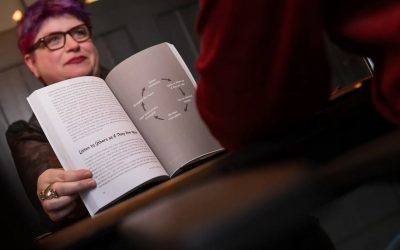Inclusiveness Isn’t as Elusive as You Think…Here’s Why
Do you find yourself “covering”?
What I mean is…do you find yourself stuck in an atmosphere where you should be having a conversation about inclusiveness…but instead, you’ve put on some camouflage?
You wouldn’t be alone.
An astonishing number of people are doing their best to blend into their surroundings.
But I understand the reasoning. Nobody wants to be a target of discrimination, recrimination, passed over for a promotion, or worse, handed a pink slip because they don’t share the views of the majority in their workplace.
Well, I say…enough.
You are Good Enough Now. And it’s time to assert yourself…but gently.
Inclusive is elusive…but achievable
Let me start by saying that I don’t expect you to stage a revolution.
If there’s anything I’ve learned from my 20-odd years as a social justice and inclusivity advocate, it’s that these things take time and patience and a good measure of humor.
But that’s not to say you should throw up your hands and say, “Oh well, I went to a couple of protests, wrote a couple of Op-Eds, and nothing has changed. I’ll just go back to blending in.”
The ripple effect of the efforts you put out into society might not be visible to you, but trust me on this: they all make a difference. And choosing not to make a difference is a poor option.
What’s the best way to make a difference?
Be yourself.
Consider these number…
Kenji Yoshino, Professor of Constitutional Law at NYU, proposed the concept of “covering” – hiding or self-limiting to make others comfortable.
In the March 2014 Harvard Business Review, Yoshino and Christie Smith, managing principal of Deloitte University Leadership Center for Inclusion, wrote an article titled “Fear of Being Different Stifles Talent”.
After surveying “some 3,000 employees in more than 20 large US firms…spanning 10 industries [that] stated [an] emphasis on inclusiveness,” their study found:
- 29% altered their attire, grooming, or mannerisms to make their identity less obvious
- 40% refrained from behavior commonly associated with a given identity
- 57% avoided sticking up for their identity group
- 18% limited contact with members of a group they belong to
- 61% of survey participants said they had faced overt to implicit pressure to cover in some way or to downplay their difference from the mainstream
- 66% of these employees said that it significantly undermined their sense of self
- 50% stated that it diminished their sense of commitment
- 51% perceived demands [to cover] from leadership that affected their view of opportunities with the organization
That’s an awful lot of people thinking they need to blend into the woodwork.
Assumptions & Judgements
Often the concept of “coexisting” is thrown around as an aspirational goal, but the truth is that we already do coexist.
We just haven’t taken the time to notice before.
Navel-gazing, self-absorption, fear of failure – and worse – the fear of offending someone prevents us from living in our own coexistence. When we pay attention, we quickly judge the scenario based on the assumptions we have consciously or unconsciously learned throughout life.
These judgments and assumptions do two things:
1) keep us safe, and
2) help us prepare for what is ahead of us.
After years of diversity and communication trainings, I am here to reclaim my judgments and assumptions.
You can, too.
It isn’t about making these judgments and assumptions that need editing; it’s what we do with the ones we make for which we need to claim our responsibility.
Once we understand who and how we are in the world, we can decide what to keep and what needs to be worked on or developed.
Instead of striving for perfection, I posit that we collectively take responsibility for who and how we are in the world.
This is a huge first step, but it is imperative. Once we know what others already know about us, we can pay more attention to others. We can engage in uncomfortable conversations and really listen to the other person.
This process isn’t about never making judgments or assumptions. It’s about recognizing that we all do. To feel prepared or safe isn’t a bad thing.
We make judgments and assumptions every time we parallel park, pick a seat in a crowded room, ask someone out on a date, vote, approach someone with a concern, or ask a question of another person.
With each question or situation, we believe we know what is going to happen next. We might be right. We might be wrong. Regardless, we have a script about the scenario that we play out in our minds. This script plays over and over again and can limit, as well as create, a sense of possibility.
The script can affect our self-talk as well as our interactions with others.
The key is the possibility of possibility.
Inclusiveness begins with a triple-spaced draft
I am not suggesting that you avoid making judgments or assumptions, but using these stories to print a draft of a story instead of a final edition.
By printing a draft, I mean spreading the concepts out, triple-spaced with extra-wide margins so that you can anticipate edits.
Print a draft of a story instead of the final edition as you engage with someone. Anticipating edits implies that your story can get better, more accurate, or change altogether.
Do you want to know the most courageous, giving, daring, and vulnerable act you can accomplish? Enter into a dialogue with someone with room for edits.
Entertain a genuine curiosity about the other person. Consider the potential of where the conversation could go.
Leave room for edits for your own growth and learning.
If you want to explore these concepts, check out the 2nd edition of my book, Good Enough Now. Like you, I’m editing my thoughts as I go along in life.
If you’d like to start a dialogue with your colleagues, start here. I’d love to be part of the conversation.
Take Your Event To The Next Level, Book Jess Today!
Take Your Event To The Next Level, Book Jess Today!
Related Blog Posts
Remove excuses, learn from failed attempts, and get back to work
Remove excuses, learn from failed attempts, and get back to work My Uncertainty research is coming together nicely, there is still time to participate if you are interested - see below. A third theme that is showing up speaks to a feeling of...
Motivate and inspire employees to act as participants in their own personal/professional growth
Motivate and inspire employees to act as participants in their own personal/professional growth As I am compiling my research results, I have to be honest, I love that both personal and professional growth is showing up as a pattern of attention in...
Successfully disrupt the normalized status quo for good
Successfully disrupt the normalized status quo for good I, Jess Pettitt, am always listening and learning. After doing some research on uncertainty with my followers and audience participants, it turns out that one of the biggest fears that is...










0 Comments